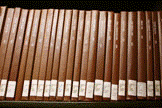Anthropology, Department of

Department of Anthropology: Theses and Student Research
First Advisor
Effie Athanassopoulos
Date of this Version
6-2017
Document Type
Thesis
Citation
A thesis presented to the faculty of the Graduate College at the University of Nebraska in partial fulfillment of requirements for the degree of Master of Arts
Major: Anthropology
Under the supervision of Professor Effie Athanassopoulos
Lincoln, Nebraska, June 2017
Abstract
This study re-examines established views on gender divisions in the nineteenth century and further investigates the relationship between identity construction and material culture, with an emphasis on clothing. Using artifacts from the Steamboat Bertrand collection as a case study, the project explores the maintenance and performance of Victorian gender ideals in Montana mining communities. Steamboat Bertrand sank in 1865 on its maiden journey to Fort Benton, Montana, carrying a variety of goods for commercial sale, as well as the personal goods of passengers aboard the ship. The artifacts excavated from the ship provide a unique examination into the lives of men and women on the frontier. Artifact analysis and historical research serve as the primary methods for exploring concepts of gender and identity. Representative textiles for analysis were sourced from both the commercial and personal cargos to better understand the fluidity of gender role performance and translation of Victorian values into western communities. Clothing, as the most personal form of material culture, provides an accessible avenue to understand concepts of both individual and community identities. Additionally, the imbalanced demographics of mining towns, such as those in Montana, provide unique scenarios for interrogating the relationship between material culture and identity construction in the mid-nineteenth century. The written narrative of this thesis is accompanied by a digital exhibit hosted on Scalar which explores similar concepts through an object-centered investigation. The project makes use of digitized primary documents, photographs, and 3D models of artifacts to present a multimedia narrative that engages the audience in a critical examination of the past. Though the digital exhibit utilizes a broader artifact set than this thesis, both projects engage in similar analyses that re-examine the experiences of men and women on the frontier. These projects engage with narratives of the past to deepen the understanding of lived experiences in western communities.
Advisor: Effie Athanassopoulos


Comments
Copyright (c) 2017, Kami Ahrens